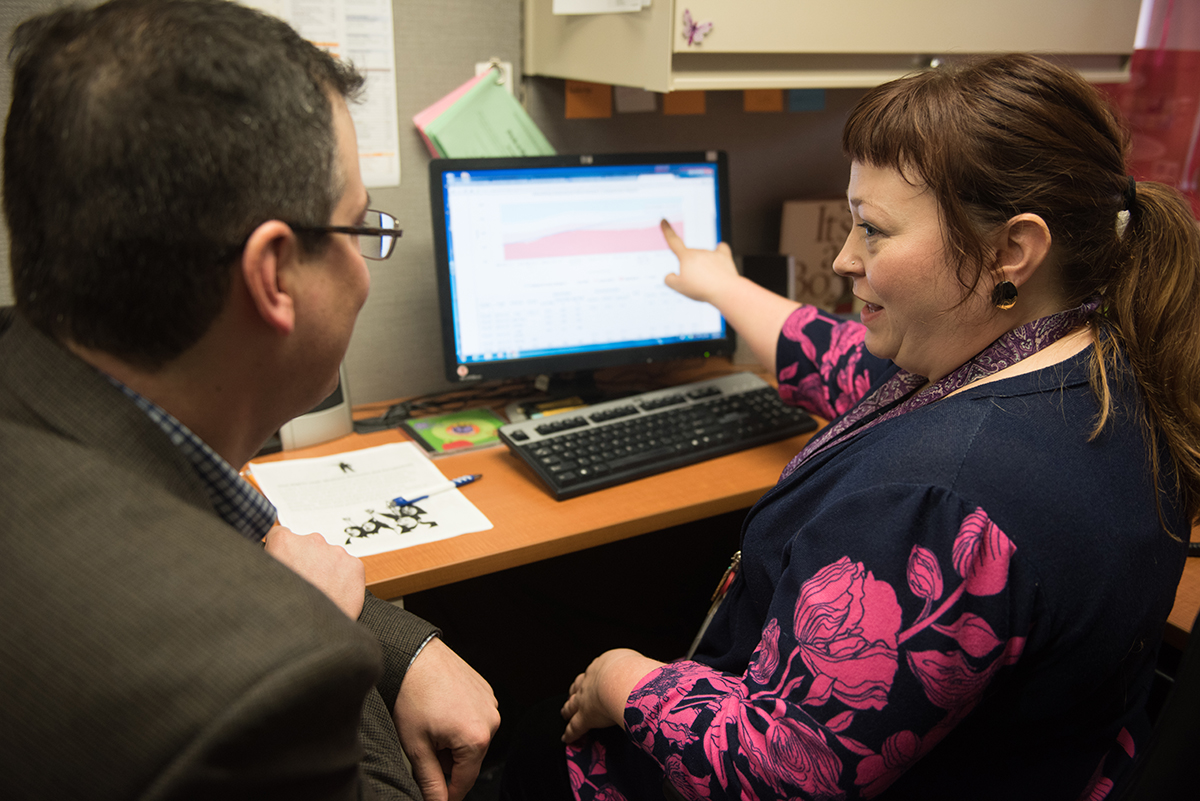Minnesota educators who responded to a recent survey overwhelmingly supported the use of educational data to improve student achievement. Leaders and classroom teachers alike agree that there is a lack of resources, expertise, and training to use data effectively.
These were some of the findings of a recent study by the University’s Center for Applied Research and Educational Improvement (CAREI) that demonstrate unmet needs for critical services in the state.
Minnesota has invested heavily to establish high educational standards and systems of accountability. That includes state and local programs to collect data, such as the Minnesota Comprehensive Test (MCT) and Minnesota Student Survey (MSS). But the study found that the intended users of the data lack the training, support, and expertise to use it.
Only a few Minnesota school districts employ staff with advanced training in research, evaluation, or assessment. Those experts are concentrated in the metro region and largest school districts. Schools and communities in greater Minnesota have very little internal capacity.
“The state needs a technical assistance center to support the use of data and evidence to improve educational outcomes,” says professor and CAREI director Ted Christ. “CAREI could be that solution.”
Building on success
With 25 years of service experience, CAREI provides services to a number of federal agencies and foundations, including projects like Generation Next in Minneapolis and St. Paul, and to 40 school districts and professional organizations that are members of its assembly. Members receive Research Watch publication, online and in-person training conferences, networking opportunities, and discounted consultation services.
Last year CAREI got a new director and an expanded vision. That vision includes increased services to schools, districts, and educational agencies throughout Minnesota.

Director Christ brought to CAREI years of experience working with classroom teachers and educational leaders. In the past decade, he worked with them to develop the Formative Assessment System for Teachers (FAST), now used in more than 30 states. FAST is designed to make it easier for teachers to collect and use meaningful educational data to inform instruction. With FAST established, Christ shifted his focus to enhance educational outcomes in Minnesota.
Kim Gibbons then joined CAREI as associate director for innovation and outreach. Previously executive director of the St. Croix River Education District in east central Minnesota, she coordinated services and provided leadership for seven rural school districts whose use of data and evidence substantially increased student achievement and state test scores, gaining national recognition.
Christ and the CAREI team started by surveying more than 800 teachers and educational leaders in Minnesota’s school districts. They engaged professional, education, and education-focused organizations in individual and group interviews and surveys. Minnesota Needs Assessment: Research, Evaluation, Assessment, and Data Use in Schools was published in February.
The results of the study provide substantial guidance regarding the state’s needs and how CAREI can contribute to meet them. With the needs assessment complete, CAREI has a firm basis to shape its mission, priorities, and functions.
Meeting the needs of students and educators
CAREI’s primary functions are to be of use to Minnesota educators and impact students, says Christ. He aims to impact 80 percent of Minnesota students over the next five years.
It’s an ambitious goal, but the need is urgent, and CAREI is positioned well to address critical needs. Educators are tremendously committed and are trying desperately hard, he believes, and their job satisfaction—and student outcomes—will improve if educators receive the support they need to use data and evidence to guide their practices.
CAREI can be a state resource for educators to access support for high quality research, evaluation, and assessment services. Compared to the current model in which educational agencies fend for themselves, CAREI may be a high-value and low-cost solution.
“Experts in research, evaluation, and assessment are difficult to recruit and expensive to retain for rural and high-need schools in Minnesota,” Christ says. “Instead, those schools rely on staff with very limited time or expertise to analyze, interpret, or report data. As a state, we continue to make substantial financial investments to collect data, but most of the state has no capacity to use it. We can do better. We owe it to the teachers, parents, and children of Minnesota to do better.”
New solutions to persistent problems
Christ envisions CAREI as a collaborator with practicing educators. Over the past year, membership in its assembly has increased 500 percent. Christ also envisions CAREI as a gateway to access the University’s many resources and experts.
“It’s not that CAREI itself with its ten Ph.D.s and nine graduate research assistants will necessarily have the solutions,” he says.
Future services will include automated data analysis and reporting for a variety of educational data in Minnesota, training materials (online guides, videos, tutorials, and conferences), research summaries, program evaluations, and a growing library of published reports on what has worked and not worked as educational solutions in Minnesota schools.
CAREI’s high-quality technical assistance for research, evaluation, and assessment must continue because the solutions to the most challenging and persistent educational problems have yet to be discovered.
“Not all programs work in all places and at all times,” says Christ. “We must discover and refine what works in each situation.”
Learn more about CAREI and read more about Ted Christ and FastBridge Learning in “Empowering teachers to help students succeed.”
REFERENCE
Minnesota Needs Assessment: Research, Evaluation, Assessment, and Data Use in Schools. (PDF) T. Christ, K. Gibbons, J. Fields, and B. Dretzke, Center for Applied Research and Educational Improvement, University of Minnesota, February 2016.
Story by Gayla Marty | Photos by Jayme Halbritter | Spring/summer 2016
 Fifth-grade teacher Sarah Norenberg and professor Ted Christ discussed data generated by the Formative Assessment System for Teachers (FAST) at L. C. Elementary School in North St. Paul.
Fifth-grade teacher Sarah Norenberg and professor Ted Christ discussed data generated by the Formative Assessment System for Teachers (FAST) at L. C. Elementary School in North St. Paul.